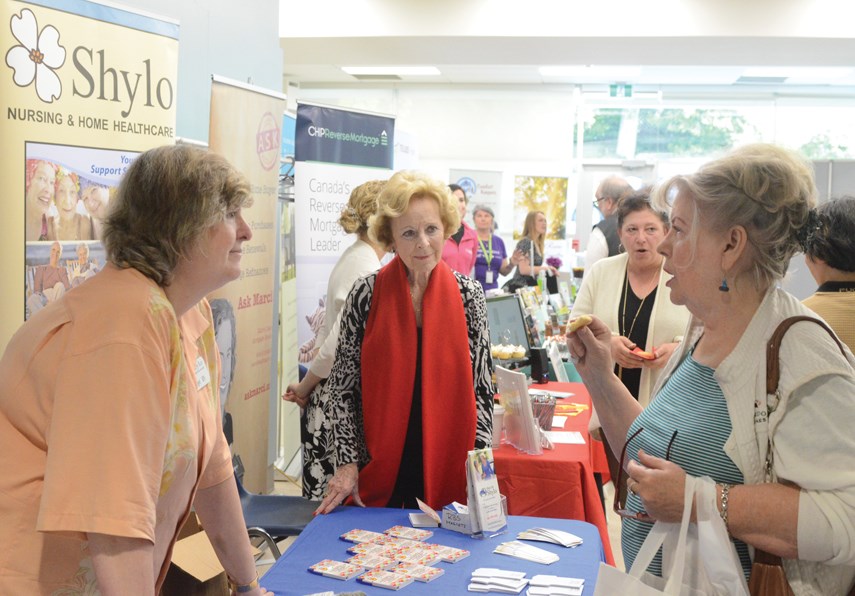I visited the fourth annual Caregiver and Senior Expo, presented by North Shore Community Resources Society and the North Shore News, over the weekend.
The event provided an opportunity to find out about the various services available to caregivers and seniors and also, according to the presenters, for caregivers to feel celebrated. The event was also sponsored by two of the professional service providers at the expo, Living Well Home Care and Shylo Home Healthcare.
What is a caregiver? According to the NSCR website on caregiving: “You are a caregiver if you provide practical or emotional assistance to a family member or friend who is living with some kind of health condition, memory loss or cognitive impairment. This includes loved ones who are quite healthy while also experiencing the challenges associated with aging.”
Most of us have taken on the role of an unpaid caregiver or will take on the role if we have loved ones or friends who need support. According to Statistics Canada, “nearly half (46 per cent) of Canadians from coast to coast to coast have provided care to a family member or friend with a long-term health condition, disability or aging need at some point in their lives.” The Family Caregivers of British Columbia say that, “There are over one million people (the estimated population of the province is 4,606,371) providing unpaid care for adult family members and friends in British Columbia.”
On the Canadian Association of Retired Persons website on caregiving, it says that nationally more than 1 million caregivers are older than 65 and the number of seniors requiring care is set to double over the next 15 years.
Caregiving entails a myriad of tasks. It can involve transportation to appointments, to see friends, or perhaps to go to a specific program targeted at the loved one or friend. It can entail personal care such as bathing, hygiene, mobility assistance, dressing and assisting with eating. It can be about providing supports like phone check-ins, companionship and emotional care, and medication management. Or it can entail proving housekeeping support such as preparing meals, running errands, yard work and housework.
CARP says that the economic value of unpaid caregivers who look after seniors can save the Canada’s health-care system up to $31 billion annually.
It is clear that caregivers are a vital part of the health-care team and most importantly their health is just as important as the health of the person they’re looking after.
Caregivers need respite from the often times onerous work that they do for their loved ones. Much of the work of caregiving, even though given with love has an emotional and physical toll.
Support for caregivers is essential. NSCR as well as Vancouver Coastal Health provide programs for caregivers – check out their websites and look for the caregiver section. NSCR also sponsors the Resource Guide for Family Caregivers: North Shore Edition, an invaluable booklet outlining and listing tools, tips, and services to support a caregiver in their role.
The private caregiving sector on the North Shore, as evidenced at the expo, is there to assist when possible, as many people in need of support may not have a family member or friend who is able to step in, or the health-care system may not be available to assist.
Also, many caregivers, if they can afford it, can use the sector to augment their own caregiving and this perhaps gives them some much needed respite.
Cherian Itty from Comfort Keepers reminded me at the expo that we shouldn’t forget about using technology to assist caregivers. We already have devices like Amazon’s Echo speaker or Google Home with voice recognition support to assist seniors in controlling smart home devices like light switches, door locks and thermostats, as well as ordering services online, and, of course, shopping.
Caregivers may not always be onsite. A new service is available from Tochie Technologies which provides personalized recordings of a caregiver’s voice and allows remote scheduling by caregivers. The recording could set up reminders to stay on top of appointments and schedules, recorded in a familiar voice. Telus has a system called Livingwell Companion which provides two-way voice access through a base unit to reach trained operators if an issue arises for a person. The service includes a help button worn as a necklace or wristband. Fall detection can be added as an option. And of course, services like Skype and Facetime can also be used to reach a loved one or friend for a virtual visit when the caregiver can’t get to visit in-person.
I found that Saturday’s expo was a good occasion for picking up information about services for caregivers and seniors – I encourage you to look out for next year’s annual event.
Margaret Coates is the co-ordinator of Lionsview Seniors’ Planning Society. Ideas for future columns are welcome. Email: [email protected]



